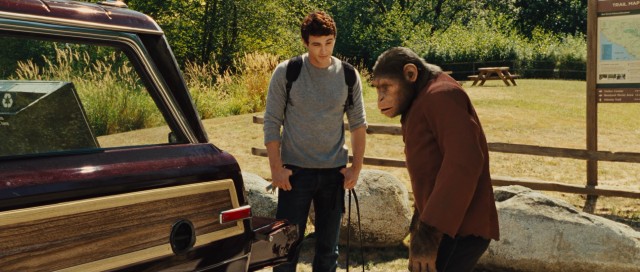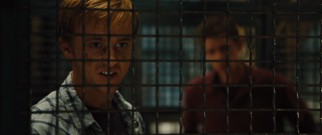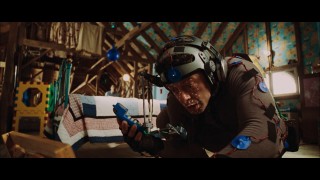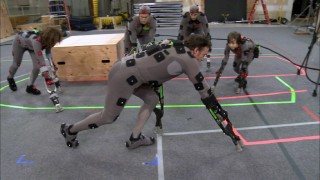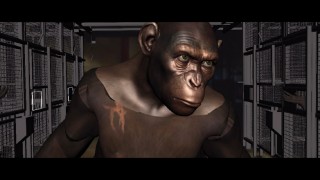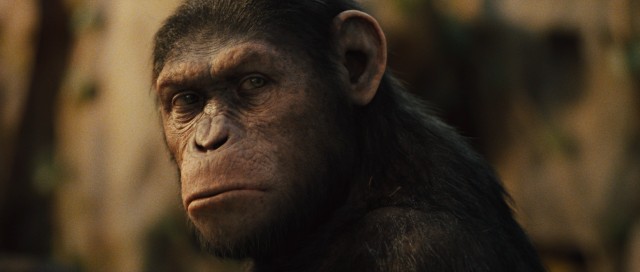Rise of the Planet of the Apes: Blu-ray + DVD + Digital Copy Review
 |
Rise of the Planet of the Apes
Theatrical Release: August 5, 2011 / Running Time: 105 Minutes / Rating: PG-13 Director: Rupert Wyatt / Writers: Rick Jaffa, Amanda Silver Human Cast: James Franco (Will Rodman), Freida Pinto (Caroline Aranha), John Lithgow (Charles Rodman), Brian Cox (John Landon), Tom Felton (Dodge Landon), David Oyelowo (Steven Jacobs), Tyler Labine (Robert Franklin), Jamie Harris (Rodney), Ty Olsson (Chief John Hamil), David Hewlett (Hunsiker), Joey Roche (Todd Hunsiker), Madison Bell (Alice Hunsiker) / Apes: Andy Serkis (Caesar), Karin Konoval (Maurice), Terry Notary (Rocket, Bright Eyes), Richard Ridings (Buck), Chris Gordon (Koba), Devyn Dalton (Cornelia), Jay Caputo (Alpha) |
Buy Rise of the Planet of the Apes from Amazon.com: Blu-ray + DVD + Digital Copy • DVD • Instant Video
 | Rise of the Planet of the Apes ranks 25th in our list of the Top 100 Movies of the Half-Decade (2010-2014). |
The original Planet of the Apes is one of the all-time great science fiction movies. Smart, fascinating, and ahead of its time in practically every way, the 1968 film doesn't always get its due, overlooked for older and flashier works, but I think it is one of the most watchable entries of its genre. Back when my DVD collection numbered only in the vicinity of 100, it more than deserved a spot; its 2-disc 35th Anniversary Edition DVD, released almost eight years ago, was the stuff of preorders. The net effect of all that was that Apes was less a franchise and more like one special film that had been developed into various other apparently profitable things. So, when it was announced that Fox was returning to the Apes well with something of a prequel/reboot, my expectations were as low as anyone's. They weren't raised by screenwriters Rick Jaffa and Amanda Silver, a team who had collaborated on three lowly-regarded thrillers in the '90s (The Hand That Rocks the Cradle, Eye for an Eye, and The Relic) and then disappeared. Nor were they elevated by the involvement of director Rupert Wyatt, whose one two shorts and one feature film (The Escapist) in his native England were entirely off my radar.
As a result, that Rise of the Planet of the Apes would go down as one of the year's most acclaimed and best-attended films was one of the biggest surprises in 2011 cinema. At a time when most of the abundant sequels offered more of the same to artistic and financial disappointment and even unprecedented tentpoles tended to coast on brand names and successful models, Rise was celebrated as something original and a bona fide departure from the series to which it ostensibly belonged.
Rise begins filling out its clean slate with Will Rodman (James Franco), a present-day San Franciscan scientist who has been heading a multi-year trial of a potential Alzheimer's cure on chimpanzees. The subject is near and dear to Will's heart; his once gifted father Charles (John Lithgow) is suffering considerably from the disease at the house they share. While Will is presenting the data to a board and expecting to clear it for human testing, one of the lab subjects suffers a violent outburst, creating a scene that rattles the company and shatters both glass and the study's hopes. Will's supervisor (David Oyelowo) deems the study contaminated, shutting it down and putting down all the chimpanzees that were being tested on.
All but one that is. It's discovered that the offending chimp was merely a protective new mother. Will secretly adopts her infant and names him Caesar. The pet chimp has a rejuvenating effect on Will's father, as do to a greater degree the vials of gene therapy medicine that Will sneaks out and administers to him. Years pass, with Caesar growing up and remaining both a son and a friend to Will and his veterinarian girlfriend Caroline (Slumdog Millionaire's Freida Pinto). Their living arrangement is called into question when Caesar stands up to a neighbor irate with Charles, whose immune system grows to resist his experimental drug and restore his dementia.
Caesar gets sent to a shelter (run by Brian Cox) more hostile than first appearances indicate. There, surrounded by less civilized and intelligent apes (plus a striking circus orangutan) and mistreated by the staff (particularly Tom Felton, better known as Harry Potter nemesis Draco Malfoy), Caesar begins to hatch a plan for an uprising and rebellion, fueled by the miracle drug. It is a bold plan with severe consequences.
To the casual observer, 2011 might have looked like any other recent year for movies: lots of sequels, lots of remakes, lots of money spent on visual effects, marketing, and 3D. But among the biggest summer films, several were of a slightly higher caliber. Rise of the Planet of the Apes ranks right up near the very top of all the aforementioned summer releases. Riveting, exciting, and substantive, Rise is like the productions of yore we point to as model summer popcorn flicks, movies like Jaws, Back to the Future, Jurassic Park, and Men in Black. Unlike those, this film was untouched by Steven Spielberg and does not yet enjoy the benefits of distance and nostalgia. Surprisingly, it doesn't need any of that. It would be silly to instantly place Rise in the same league as those beloved classics and I won't. But if my first impression and the film's appeal hold up, this is destined for the same crowd-pleasing status.
This is a very well-made movie. Running 105 minutes with coda and long credits, it's taut, lean, and always interesting. It offers links to the Charlton Heston classic in using one of its most iconic lines and a number of subtler ways, but generally, it stands on its own. These aren't ape-men, but apes. That distinction eliminates any potential camp value, something easily found in Burton's remake, surely in those four sequels, and some would argue even in the initial 1968 blockbuster. What Rise lacks in memorable dialogue and meaty human performances, it makes up in a sturdy fundamental story and some of the greatest visual effects ever put on film.
The original Planet was hailed back in the late '60s for its remarkable make-up effects, the source of its one and only Oscar win (an honorary award, long predating the introduction of a competitive category). How far we've come since then. You'll be much too swept up in the narrative to give the astonishing work of Weta Digital its due. The New Zealand outfit has wowed us over the past decade since rising to prominence on founder Peter Jackson's Lord of the Rings trilogy. Rise raises the art form to new heights with its utterly realistic computer-animated apes that lean heavily on motion capture performances.
In the role of Caesar, mo-cap legend Peter Serkis (the man who brought Gollum and Jackson's King Kong to life) has received special notice and widespread hope that the powers that be can recognize his human craft at the center of such state-of-the-art technology. It is a poignant performance, so much emotion conveyed in the signing chimp's green-flecked eyes. That is the heart of the film and if you ever for a second detected artificiality, the entirety would suffer. You do not, however, and that is the very definition of outstanding visual effects, which aren't put on parade for spectacle but used in precisely the way that the story requires them. I would be disappointed if this doesn't pick up an Academy Award in that domain, a category whose short list of fifteen contenders it naturally made earlier this month. The award might, however, be the only bone thrown Harry Potter's way, insufficient but believable recognition for that absurdly winless 10-year fantasy franchise. In truth, any of the seven preceding Potter films would have been as worthy of such an honor that Weta productions have won five times in the last ten years.
If, as quite foreseeable, Rise does not win any major awards this season, at least it will have won something more meaningful: public approval. The film, moderately budgeted for a tentpole at $93 million, outgrossed many of the more promising summer flicks that opened before it, including all three Marvel Studios movies globally. What's more, Rise did it without the international boost of 3D engagements (it was just one of a few major summer films to forego that gimmick). On the heels of that gratifying $481 M global run, the movie came to home video last week in a single-disc DVD and a two-disc Blu-ray + DVD + Digital Copy that shakes up Fox's usual combo pack design. Read on for our review of the latter. VIDEO and AUDIO
There's excellence to be found in both the Blu-ray's picture and sound. The 2.40:1 transfer is clean, sharp, and worthy of any superlative you can apply. As can be expected of a film featuring animal revolt, the 5.1 DTS-HD master audio is active and engulfing. To boot, it's also crisp and consistent.
The DVD offers a less dazzling experience, but even sharing space with digital copies, the presentation is quite satisfactory by 480p definition standards. Likewise, the Dolby Digital 5.1 lacks impact but only by comparison. Those accustomed to DVD and watching on a modest screen/system should be pleased.
BONUS FEATURES, MENUS, DESIGN and PACKAGING
Unsurprisingly, Rise of the Planet of the Apes has been treated to a wealth of bonus features on Blu-ray, all of which are presented in HD. They start with eleven brief deleted scenes (12:00), most of which feature Andy Serkis in motion capture suit performing as Caesar. Rather than carrying real plot significance (apart from an alternate ending of sorts), they demonstrate just how awkward acting in this movie, as ape or man, must have been.
"Mythology of the Apes" (7:11) briefly celebrates the 1968 movie (complete with a widely disseminated spoiler) before establishing this as a departure from that and discussing the rationale behind it. Then it points out some small allusions and homages to the original.
"The Genius of Andy Serkis" (7:48) pays needed notice to the man whose acting craft has repeatedly elevated the dramatic power of motion capture. We get footage of him and others at work, looking ridiculous.
Topical making-of featurette "A New Generation of Apes" (9:41) further discusses how performance capture was used and the technology and design details that went into the primate animation.
A Scene Breakdown presents a 90-second clip (the cookie scene) in three different states depicting early animation, raw performance capture footage, and the final product. You can use your remote's color buttons to toggle between them.
A Character Concept Art Gallery consists of seventeen images of six primate characters, the nature of which is not always clear.
"Breaking Motion Capture Boundaries" (8:43) looks again at the primary production technique with behind-the-scenes footage of how mo-cap was, for the first time, applied to a real outside location. "The Great Apes" (22:37) profiles the film's three focal primate species: chimpanzees, gorillas, and orangutans. Each is given its own segment, starting with some text facts and then turning into expert talking heads and zoo and research footage covering behavior, likes, and conservation efforts. It's good information and relevant enough.
Two audio commentaries are offered. The first features director Rupert Wyatt by himself. His passion is evident, as he discusses his intentions and subtle details he observes at every pertinent spot. As hard as he tries to give an interesting reading, though, he could clearly use someone to bounce off of and not just to fill the occasional lull. From acknowledging a plot hole to the various films he pays homage to, Wyatt's solo track is a moderately easy listen.
The second commentary is supplied by writers/producers Rick Jaffa and Amanda Silver. Though their comments deal primarily with their script, they have plenty to say about it, touching on their inspirations (including the subject of this year's Oscar-seeking documentary Project Nim), ideas used and discarded, links to the original movie, themes they tried to incorporate (like using "monkey" as a derogatory term), and the changes they made along the way. One track with all three speakers would have probably been best, but if you only have time for one commentary, this is the more engaging.
Rise's three theatrical trailers are kindly preserved for individual or collective (6:29) viewing. They reveal a bit too much and don't adequately indicate the film's quality, but they must have helped sell tickets, so they got that going for them. That is all in the way of marketing; pointing to a change in protocol (or maybe just disc pressing), no Fox Movie Channel Presents specials are provided.
The Sneak Peek menu provides trailers for Machine Gun Preacher, Immortals, Another Earth, and There Be Dragons plus an FX promo. Finally, there are Live Extras. Happily, though I disconnected my memory stick as a precaution, the disc did not seem to produce choppy playback on my Sony player on account of a constant Internet connection. The disc is equipped with Live Lookup, which is able to display relevant IMDb data while the movie plays. There is also the usual "What's New" section of Fox trailers and bonus feature excerpts, which include the Rise exclusive short "Ape School." Whether you choose to stream or download, this supposedly 2-minute feature will take many minutes and more than a little patience to watch. My stream wouldn't play after about ten minutes of trying to load, a fact likely related to the insufficient space I had for downloads. After erasing all my saved data, I could access the first 22 seconds of the short with repeated interruptions in the stream. Then I was told I didn't have an Internet connection. Ugh. BD-Live ought to be used as a selling point for DVD.
A surprise and disappointment here is that Fox seems to have switched over from their usual three discs to the two-disc combo pack model long employed by Warner and Paramount. That changes the DVD of this set from the one sold on its own to a stripped-down disc that shares its limited space only with two digital copy files (one in iTunes format, one in Windows Media). That is bad news for DVD fans who have put off upgrading to Blu-ray but still see the value in combo packs. And it doesn't bring down Fox's standard combo pack price point. The Rise DVD sold on its own apparently offers just a few items: the "Mythology" and Andy Serkis featurettes, and at least some of the deleted scenes.
On both Blu-ray and DVD, the main menu starts with a trip through Caesar's eyes and into his DNA, but soon settles into a standard scored montage. The BD supports bookmarks and resuming; at the end of 2011, Fox is up there with Criterion and Sony as the studios best at Blu-ray authoring (though bonus feature subtitles would be nice).
The two discs are packaged in a ecologically cut Blu-ray case, one that's topped by a cardboard slipcover that does more than just repeat the keepcase art below. This one embosses the title and Caesar's face, whose eyes are rendered holographic. The rear foregoes the credits text and technical data in favor of more imagery from the film and critics' quotes. A single-sided insert supplies your digital copy redemption instructions and code.
CLOSING THOUGHTS
Defying expectations, Rise of the Planet of the Apes is one of 2011's best films. Without being the most distinctive or ambitious production, this is unconventional and inventive enough to stand out and stir as few big summer movies ever have. With a great feature presentation and a good supply of extras, Fox's combo pack will delight those with Blu-ray capabilities, but forward-thinking DVD viewers will be bummed to find the DVD pales in comparison to the one sold separately. Nonetheless, this set is highly recommended for just about anyone.
Support great cinema and this site when you buy Rise of the Planet of the Apes now |
Related Reviews:
DVDizzy.com | DVD and Blu-ray Reviews | New and Upcoming DVD & Blu-ray Schedule | Upcoming Cover Art | Search This Site
DVDizzy.com Top Stories:
Dawn of the Planet of the Apes • War for the Planet of the Apes
Planet of the Apes (Original 1968 Movie on Blu-ray) | New: Kung Fu Panda 2 • Mr. Popper's Penguins • The Help • The Smurfs
2011 Summer Movies: X-Men: First Class • Thor • Pirates of the Caribbean: On Stranger Tides • Captain America: The First Avenger • Zookeeper
James Franco: 127 Hours • Eat Pray Love • Annapolis | Freida Pinto: Miral • You Will Meet a Tall Dark Stranger
John Lithgow: 3rd Rock from the Sun: The Complete Season One • Footloose (1984) | Andy Serkis: Inkheart • The Prestige
Tom Felton: Harry Potter and... The Prisoner of Azkaban • The Goblet of Fire • The Deathly Hallows Part 1 • Deathly Hallows Part 2
Brian Cox: Rushmore (Criterion Collection Blu-ray) • Zodiac (Director's Cut)
Motion Capture: District 9 • Avatar (Extended Collector's Edition) • A Christmas Carol (2009) • Beowulf • Mars Needs Moms
Text copyright 2011 DVDizzy.com. Images copyright 2011 20th Century Fox, Dune Entertainment, Chernin Entertainment, and Fox Home Entertainment.
Unauthorized reproduction prohibited.
